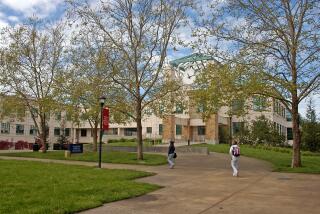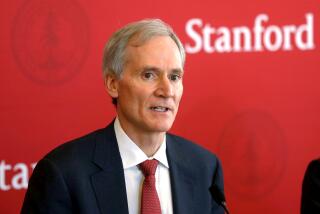DNA pioneer quits over uproar on racial remarks
- Share via
Nobel laureate James D. Watson, the renowned co-discoverer of the structure of DNA, resigned Thursday as chancellor of the prestigious Cold Spring Harbor Laboratory in the aftermath of an uproar over racial comments he made recently.
The lab’s board of directors suspended him last week after comments that he made in an interview appeared in the Oct. 14 Times of London.
The board said its members “vehemently disagree with these statements and are bewildered and saddened.”
Watson, 79, said in an e-mail statement that the change in leadership was “overdue.”
“The circumstances in which this transfer is occurring, however, are not those which I could ever have anticipated or desired,” he continued.
Board Chairman Eduardo Mestre said: “For over 40 years, Dr. Watson has made immeasurable contributions to the laboratory’s research and educational programs. The board respects his desire to retire at this point in his career.”
Nobel laureate Thomas R. Cech of the University of Colorado said, “It is very unfortunate what has transpired.” Watson transformed Cold Spring Harbor Laboratory in New York from “a sleepy place” to what is now “a really remarkable institution, unique in the world both in terms of its impact on biomedical science and the way it brings together scientists from all over the world through its conference programs and workshops,” Cech said.
Watson’s “charisma and his intense focus and his scientific taste was impeccable,” he added.
The controversy arose while he was in Europe to publicize his book “Avoid Boring People.”
In the Oct. 14 article, his former protege Charlotte Hunt-Grubbe wrote: “He says that he is ‘inherently gloomy about the prospect of Africa’ because ‘all our social policies are based on the fact that their intelligence is the same as ours -- whereas all the testing says not really.’ . . . He writes that ‘there is no firm reason to anticipate that the intellectual capacities of peoples geographically separated in their evolution should prove to have evolved identically.’ ”
A firestorm of criticism erupted, and London’s Science Museum canceled a sold-out lecture he had scheduled.
Watson apologized “unreservedly,” saying, “This is not what I meant.” But the damage had been done. He was forced to cut his trip short and return home, where various groups issued highly critical statements.
Dr. Francis Collins, director of the National Human Genome Research Institute, said: “I am deeply saddened by the events of the last week, and understand and agree with Dr. Watson’s undoubtedly painful decision to retire in the aftermath of a racist statement he made that was both profoundly offensive and utterly unsupported by scientific evidence.”
The Federation of American Scientists said Watson was promoting “personal prejudices that are racist, vicious and unsupported by science.”
Watson shared the 1962 Nobel Prize in physiology or medicine with Francis Crick and Maurice Hugh Frederick Wilkins, both deceased, for identifying the double-helical structure of DNA.
He will be replaced as chancellor by Dr. Bruce Stillman, the laboratory president.
--
More to Read
Sign up for Essential California
The most important California stories and recommendations in your inbox every morning.
You may occasionally receive promotional content from the Los Angeles Times.










